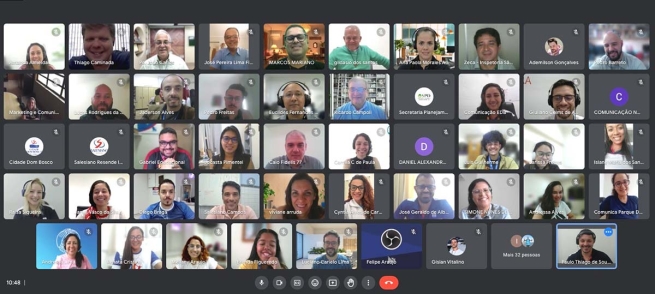According to the CONAC coordinator, Fr João Carlos Ribeiro, the Salesian Communication Forum is a continuation of the work and studies carried out during the Salesian School of Communication some months ago. “The proposal is in line with the ‘Forum Dom Bosco’, an area created by the Salesians to bring together young people and educators to tackle the theme of communication”, he said.
The work began with a prayer and meditation proposed by the Provincial Delegate for Communication from the Porto Alegre Province, Thiago Caminada. The group prayed the communicator's prayer together, based on the traditional "Prayer of St Francis".
Gildásio Mendes, author of the in-depth document, gave a short introduction to the topic. He recalled that Brazil today is one of the world's reference points for Salesian communication. That is why he emphasised the importance of holding the Forum. “This forum is a space for synodality. It's a time to listen to what the laity have to say, as was proposed by the 'Don Bosco Digital Forum'. This is the first group in the congregation to meet to study the document in depth” he said.
He then placed the document in the context of the current situation in the world, where communication is a fundamental tool for companies and governments, and it cannot be otherwise within the Church and the Congregation. “Today's digital communication and artificial intelligence are the centre, the engine that controls societies. Economy, politics, religion, society and even war depend on communication. Communication is geopolitics, economics, management, it is everything. All the world's great politicians think first about how to manage communication” he said.
Fr Gildasio Mendes also emphasised the need to contextualise the moment communication is experiencing in the Salesian world, because the effect of the communication actions carried out, even in the smallest environment of Salesian presence, have impacts similar to those of large companies and governments around the world. “Be careful who does the news in your Province, because they have great power to interpret and publish the news. Digital is power, it is communication, it is networking. This is the first principle” he warned, pointing to artificial intelligence technology as a sensitive factor to be studied and formed in, in order to use it as a communication tool in Salesian environments. "As communicators, it is important to read, and guide provincials on how to prepare and communicate well with artificial intelligence. Identify what ethics (of artificial intelligence) is for the world, what values it adds" he advised.
Subsequently, Forum participants were divided into groups to investigate and highlight the elements they considered most relevant in the document. Among the conclusions presented by the reflections, we can highlight the need for every Salesian, whether religious or lay, to be a communicator according to Don Bosco's charism, to know and master the language of the digital world, to meet boys and young men in this virtual world, and to live the "sacrament of presence", with "loving-kindness", in order to infuse Salesian values into real life, which remains despite the digital world.
One of the groups also analysed digital media using Plato's “cave myth” "This led us to question how we Salesians “project” our shadow to the point of helping young people understand the reality they find themselves in, through the development of critical sense, the search for truth and ethics," said Salesian practical trainee Joshua Gabriel Ribeiro, on behalf of one of the groups.
After the presentations of the groups’ summaries, Fr Gildasio Mendes concluded by reminding us that the world of communication is always ambiguous and contradictory. “The world today is searching for the basics. The digital world needs to bring young people into the real world. People want a family, they want to walk the streets. People are tired of sitting in front of computers” he said.
Another point highlighted by the General Councillor for Social Communication was the recognition that, just as in the real world, the quality of content in the digital world is also based on the criteria of originality, truthfulness and creativity. “Evangelising in the digital world is sharing in the online world what is original, authentic and true, and which is the fruit of an experience, such as visiting a favela, the sick, the poor. The power of evangelisation in the digital world must come from experience. Every time a group of young people recounts an experience, they have the opportunity to evangelise online” he said.
In conclusion, Fr Gildasio Mendes presented a model to identify levels of communication based on Jesus Christ, adopted as a model for effective and authentic communication. These are five progressive levels:
5) Crowds - Jesus proclaimed the beatitudes to the crowds, but not everyone understood, although the message was clear.
4) Chosen group - Jesus spoke to 72 disciples, a group in which he knew the largest number of people, selected on the basis of trust. They were the first evangelisers.
3) The 12 apostles - Jesus calls each one by name, working in a small group communication, where there is much more commitment.
2) The closest - Jesus, in the transfiguration, provides an even smaller group with deeper interpersonal communication.
1) Personal - Jesus speaks to the Magdalene, the Samaritan woman and Nicodemus and achieves a completely personal communication.
“When communicating in the digital world, we have to pay attention to these levels to avoid disappointment. These criteria can help us develop digital communication. It is necessary to work on different levels. Humanise the digital world, create spaces for people where they can create communication experiences” he concluded.


